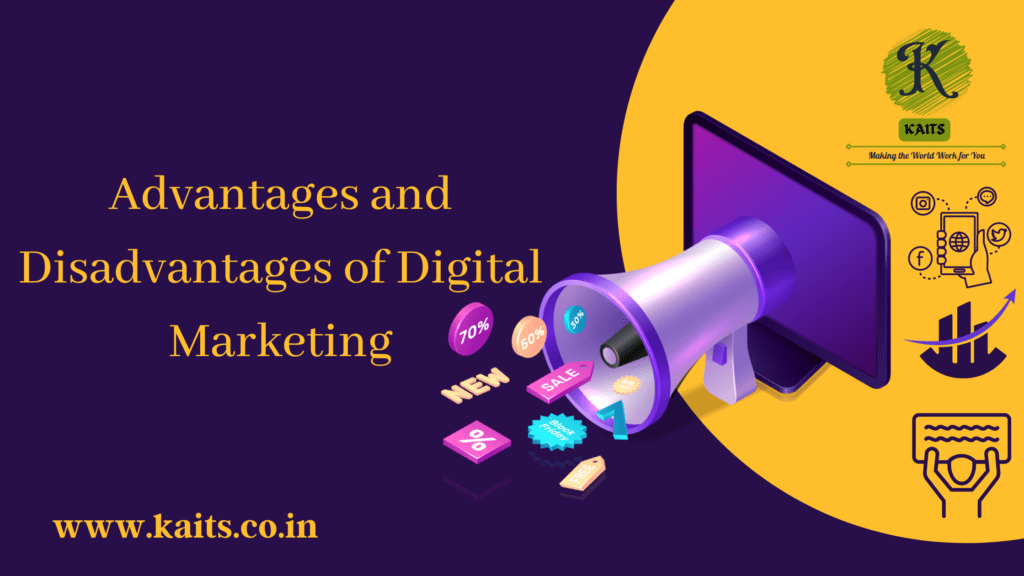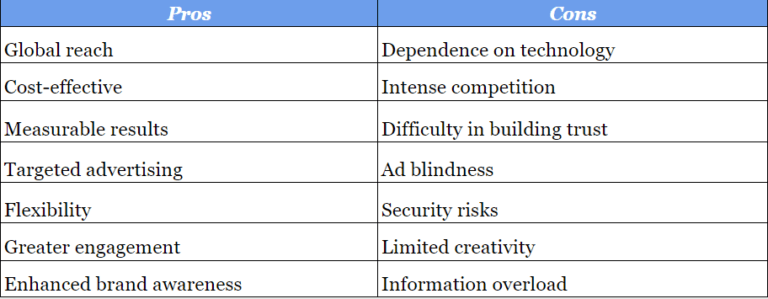Digital marketing utilizes digital technologies to market and advertise products or services through multiple digital channels. These channels include search engines, social media platforms, email communication, and mobile applications. The ultimate goal of digital marketing is to reach and engage with potential customers through various digital touchpoints, thereby increasing brand awareness, driving website traffic, and ultimately generating sales or conversions. By leveraging digital tools and platforms, businesses can target specific audiences, track performance metrics, and adjust their strategies to optimize their marketing efforts. However, digital marketing also has advantages and disadvantages that must be considered.

Key Highlights
Advantages:
- Digital marketing enables businesses to reach a global audience at a relatively low cost.
- Compared to traditional marketing methods, digital marketing is often less expensive and more targeted.
- Digital marketing allows businesses to track and measure the success of their marketing campaigns efficiently.
- Digital marketing campaigns can be easily modified and adapted to changes in the market, allowing businesses to respond quickly to emerging trends and customer preferences.
- Digital marketing allows businesses to increase their brand awareness and visibility online, reaching a wider audience and increasing their market share.
Disadvantages:
- Digital marketing requires businesses to have access to reliable technology and digital infrastructure.
- With the increasing popularity of digital marketing, the competition has also become more intense.
- Digital marketing often relies on customer data and personal information, which can lead to a lack of trust and decreased customer loyalty.
- Customers are becoming increasingly desensitized to digital advertising, with many ignoring or blocking ads altogether.
- Digital marketing can be limited in creativity and vulnerable to security breaches and cyber-attacks.
Pros and Cons of Digital Marketing

Advantages of Digital Marketing
- Global reach: Digital marketing enables businesses to reach a global audience at a relatively low cost. This allows businesses to expand their reach beyond their local market and target potential customers worldwide.
- Cost-effective: Compared to traditional marketing methods such as print, radio, or TV advertising, digital marketing is often less expensive. It allows businesses to target specific demographics and geographic locations with less wastage, resulting in higher ROI.
- Measurable results: With digital marketing, businesses can easily track and measure the success of their marketing campaigns. This enables businesses to make data-driven decisions and adjust their strategies accordingly to achieve better results.
- Targeted advertising: Digital marketing allows businesses to target specific customer segments based on demographics, interests, and behavior. This makes advertising more personalized and relevant, increasing the chances of conversion and customer retention.
- Greater engagement: Digital marketing allows businesses to engage with customers in real time through social media, chatbots, and other digital channels. This creates opportunities to build relationships and increase customer loyalty.
- Flexibility: Digital marketing campaigns can be easily modified and adapted to changes in the market, allowing businesses to respond quickly to emerging trends and customer preferences. This enables businesses to stay ahead of the competition and adjust to changing market conditions.
- Enhanced brand awareness: Digital marketing allows businesses to increase their brand awareness and visibility online, reaching a wider audience and increasing their market share.
Digital marketing presents various benefits to businesses. Firstly, it allows global reach and cost-effectiveness. Secondly, it provides measurable results and targeted advertising. Additionally, it offers greater engagement, flexibility, and enhanced brand awareness. Consequently, digital marketing is a valuable tool that businesses can use to promote their products or services in the current digital world.
Disadvantages of Digital Marketing
- Dependence on technology: Digital marketing requires businesses to access reliable technology and digital infrastructure. If technical issues arise, it can negatively impact a business’s ability to reach its target audience.
- Intense competition: With the increasing popularity of digital marketing, competition has also become more intense. Businesses may struggle to stand out in a crowded marketplace and attract customers.
- Difficulty building trust: Digital marketing often relies on customer data and personal information. This can make customers wary of sharing their personal information, leading to a lack of confidence and decreased customer loyalty.
- Ad blindness: Customers are becoming increasingly desensitized to digital advertising, with many ignoring or blocking ads altogether. This can make it difficult for businesses to reach their target audience and achieve their marketing goals.
- Limited creativity: Digital marketing can be limited in the invention, as it is often constrained by the capabilities of digital platforms and technologies. This can make creating unique and memorable marketing campaigns difficult for businesses.
- Security risks: Digital marketing often involves collecting and using personal data, which can be vulnerable to security breaches and cyber-attacks. This can damage a business’s reputation and erode customer trust.
- Information overload: The abundance of digital marketing channels and messages can lead to information overload for customers, making it difficult for businesses to stand out and capture their attention.
Overall, while digital marketing offers many advantages, such as increased engagement, targeting, and ROI, it also has drawbacks, such as dependence on technology, intense competition, difficulty building trust, ad blindness, limited creativity, security risks, and information overload. Businesses need to consider these factors when developing their digital marketing strategies carefully.
FAQs on Advantages and Disadvantages of Digital Marketing
1. What are the advantages of digital marketing for businesses?
The advantages of digital marketing for businesses include global reach, cost-effectiveness, measurable results, targeted advertising, greater engagement, flexibility, and enhanced brand awareness.
2. What are the disadvantages of digital marketing for businesses?
The disadvantages of digital marketing for businesses include dependence on technology, intense competition, difficulty building trust, ad blindness, limited creativity, security risks, and information overload.
3. How does digital marketing help businesses reach a wider audience?
Digital marketing helps businesses reach a wider audience by leveraging digital channels such as social media, email, and mobile applications. These channels enable businesses to connect with customers worldwide and target specific customer segments based on demographics, interests, and behaviors.
4. How does digital marketing impact a business’s ROI?
Digital marketing can impact a business’s ROI by providing measurable results that enable businesses to optimize their campaigns for better performance. By tracking website traffic, conversion rates, and other vital metrics, businesses can make data-driven decisions and adjust their strategies to improve their ROI.
5. How can businesses overcome the challenges of digital marketing?
To overcome the challenges of digital marketing, businesses need to carefully consider their target audience, develop a clear marketing strategy, and leverage data analytics to measure the success of their campaigns. Businesses must also stay current on digital marketing trends and technologies and adapt their strategies accordingly.
Businesses need to consider both the advantages and disadvantages of digital marketing when devising a marketing plan that fits their objectives and financial resources. This approach enables them to make the most of the opportunities offered by digital marketing while mitigating potential drawbacks and difficulties.
Are you looking to establish your business on the Internet? Look no further than KAITS, the top Digital Marketing Company in India. We aim to help you succeed and equip you with the necessary skills to run a profitable business. KATIS is a revolutionary platform that will take your IT/ITES ventures to new heights by providing access to a team of highly-trained IT professionals. However, keeping up with the latest technological advancements often requires more time and resources than most companies have. Thus, you should contact KAITS for top-notch SEO and Digital Marketing services.
